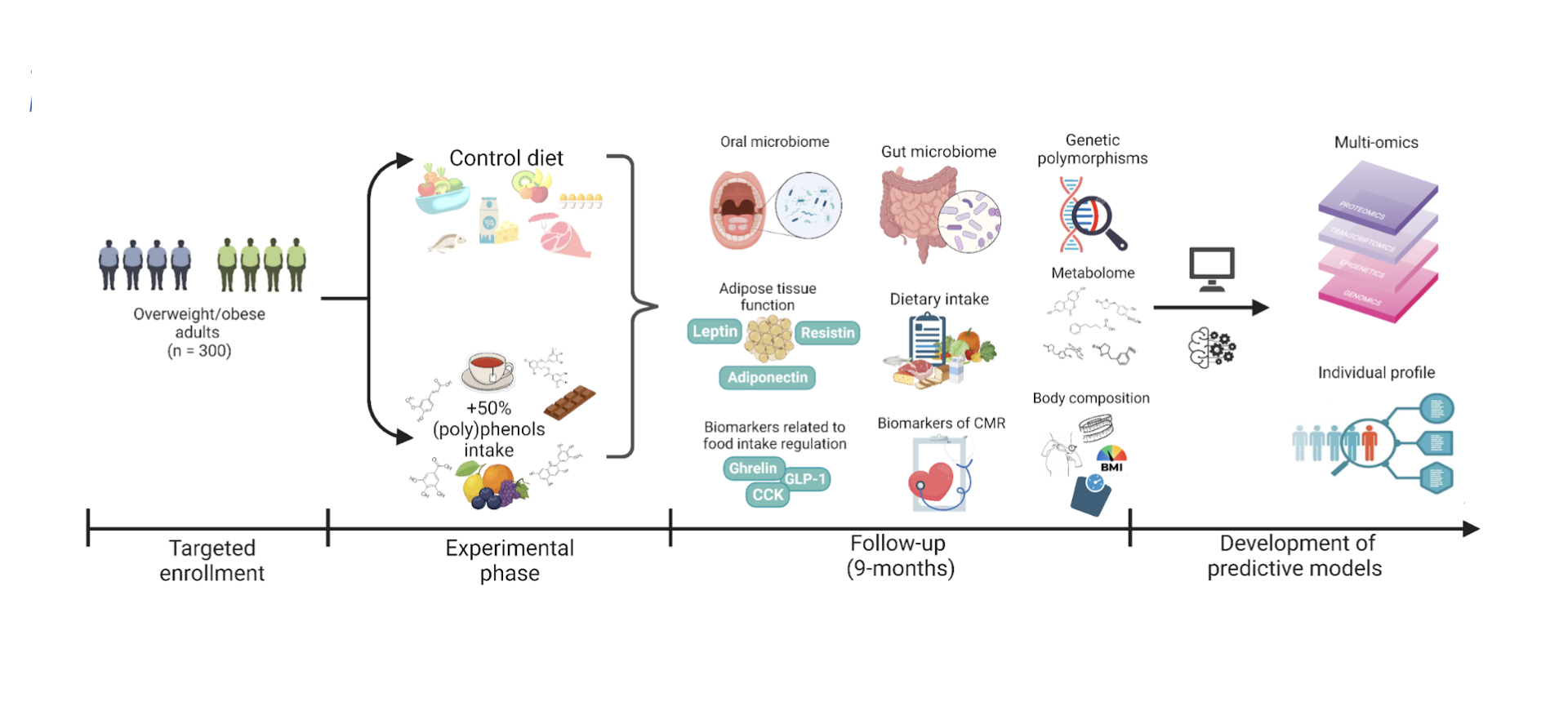Funded under the National Recovery and Resilience Plan (NRRP), Mission 4 Component 2 Investment 1.3, Theme 10.
Understanding the relationship between metabolic processes and obesity: preventing it with a plant-based diet in the obi-wan-diet research project
A multi-omics approach to tackle obesity at individual level with plant-based diets

Gabriele Scrofani
Science writer
More and more people suffer from overweight or obesity, leading to related cardiometabolic diseases. To deal with this epidemic, nutritional education and a balanced and varied diet are needed, but also practical tools to predict how individuals will respond to specific diets.
Personalized nutrition can help create dietary recommendations tailored to the unique characteristics of each person. The OBI-WAN-DIET project, a flagship initiative of Spoke 4 in the OnFoods program, is tackling this challenge through frontier research on a large cohort of participants. Its goal is better to understand the relationship between various metabolic processes and obesity and to implement preventive measures through plant-based nutrition.
The environment we live in increasingly favors widespread obesity, driven by the availability of poor-nutritional quality, high-calorie foods, and a sedentary lifestyle. According to the 2022 WHO Regional Obesity Report, overweight and obesity are the fourth most common risk factor for non-communicable diseases (NCDs) in Europe. The report reveals that 59% of European adults and nearly 1 in 3 children (29% of boys and 27% of girls) are overweight or obese. Spoke 4 of OnFoods aims to improve consumer health through sustainable and personalized diets. One of the group’s flagship projects is OBI-WAN-DIET: A multi-omics approach to tackle obesity individually with plant-based diets, coordinated by professors Pedro Mena and Daniele Del Rio of the University of Parma.
The project’s name references Obi-Wan Kenobi, one of Star Wars's most iconic characters and a classic example of the archetypal mentor in storytelling. Much like the fictional mentor, OBI-WAN-DIET seeks to position itself as a scientific guide, leading research toward innovative and personalized nutritional strategies to combat obesity at individual level.
“There is a segment of the population at risk of cardiometabolic diseases, including atherosclerosis, type 2 diabetes, and obesity. Unfortunately, prevention may be ineffective for some individuals, as no one-size-fits-all. Plant-based diets are highly effective in reducing cardiometabolic risk, but not everyone metabolise dietary (poly)phenols likewise. There is significant interindividual variability, closely linked to the gut microbiome profile, which influences the metabolism of (poly)phenols,” says Pedro Mena, Associate Professor of Human Nutrition at the University of Parma and co-lead researcher of the OBI-WAN-DIET project.
(Poly)phenols play a central role in the project. These beneficial substances are present in many plant-based foods and have been extensively studied for their intriguing properties. “Among the plethora of (poly)phenols described, there are 70–80 different compounds which, when consumed in significant quantities and regularly, have multiple broad-ranging effects. (Poly)phenols are involved in many aspects, from cognitive decline and endothelial function to insulin secretion and adipose tissue regulation. It’s impossible to identify a specific (poly)phenol class to combat obesity and its complications; otherwise, we would already have a dedicated drug. Diet diversity is the winning strategy” explains Mena.
A pivotal 2017 review showed that some classes of (poly)phenols contribute to a reduced waist circumference or help regulate hunger and satiety hormones, promoting cardiometabolic well-being. However, a recent systematic review conducted by the Human Nutrition Unit of the University of Parma, headed by Mena himself, suggests that the preventive efficacy of these compounds depends on their high individual variability. This variability in response to (poly)phenols is the main obstacle to fully harnessing their health potential, which is why the project seeks to understand their applicability within dietary regimens aimed at preventing metabolic diseases.
This is being achieved through a large-scale study involving 500 participants at cardiometabolic risk, such as those with obesity, hypertension, or high cholesterol. From these 500 participants, 330 are being recruited, based on how they metabolize phenolic compounds, using a profiling test called OPCT, Oral (Poly)phenol Challenge Test. Researchers administer lifestyle, physical activity, and diet questionnaires while measuring anthropometric and body mass parameters like weight, fat, and lean mass. Saliva and blood samples are analyzed to study the metabolome, microbiome, genes, and weight-related hormone levels. Saliva swabs are crucial in examining oral bacteria, which, although seemingly unrelated to metabolic diseases, may be linked to obesity risk. And this is also a way to foster academic collaborations with other OnFoods partners, as the University of Milan.
The gut microbiota also plays a crucial role in (poly)phenol metabolism, with its composition varying significantly among individuals. This underscores substantial differences in the metabolism and absorption of these bioactive food compounds, defining diverse metabolic phenotypes or metabotypes. Thus, specific analyses of each person and their metabolism are essential. SNPs, or single nucleotide polymorphisms, also contribute to this interindividual variability. Without being overly technical, these mutations affect a single fragment of the DNA sequence. Common in the human genome, SNPs represent a source of intersubjective variability and can influence many traits, such as the activity of enzymes involved in (poly)phenol metabolism. Recognizing their importance, OBI-WAN-DIET includes SNP analysis among participants to determine their response to personalized plant-based diets.

Researchers develop personalized dietary models based on individuals’ biological and lifestyle characteristics. Assessing these singularities together with the myriad of data collected will serve to evaluate the effectiveness of a personalized diet. The 330 participants are divided into two groups based on their phenolic profiles, referred to as metabotype A or metabotype B. Each group is further divided into intervention and control subgroups to monitor treatment differences. The intervention group receives a personalized diet based on their eating habits, with at least a 50% increase in the actual (poly)phenol intake. Meanwhile, the control group receives general healthy eating recommendations. The aim is to evaluate whether specific food consumption and adherence to personalized dietary regimens impact obesity prevention and health improvement, while considering individual differences in the metabolism of (poly)phenols. Of note, some industrial partners of OnFoods, like De’Longhi and Barilla also contribute to the project, as well as other Italian and overseas companies.
The project also emphasizes a healthy and sustainable diet, which must be accessible and environmentally friendly. This is why a plant-based diet was chosen. But animal-based foods are also included in the dietary plans, in line with guidelines for a healthy diet, to favour personalization and increase adherence to the study protocol. However, Mena reassures that the diets’ sustainability will be assessed in collaboration with OnFoods Spokes 2 and 7, also at the University of Parma. Then he concludes: “The project is one-third completed, and we aim to finish by autumn 2025. We have an incredible team that will make it possible.”
It is important to remember that obesity is a multifactorial disease. By integrating genetic data with metabolomes, microbiomes and other individual factors, this multi-omics project seeks to develop predictive models for managing weight in overweight and obese individuals.


Gabriele Scrofani
Science writer
My name is Gabriele Scrofani, and I am from Ragusa, Sicily. Curious, enthusiastic, and eclectic, I'm interested in animal husbandry, food production, and the environment. I followed the master's course in science communication at Sissa, Trieste, and had a master’s degree in innovative and sustainable animal production at the University of Parma. I’m into social network dissemination, videomaking, and article writing.
This blog post is related to
Food quality and nutrition
To push towards sustainable and tailored food and nutrition
A multi-omics approach to tackle obesity at individual level with plant-based diets
Principal investigators
Referred to
Spoke 04


